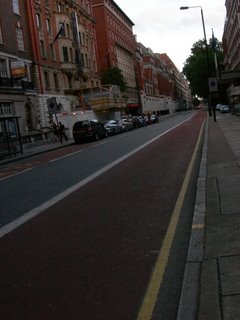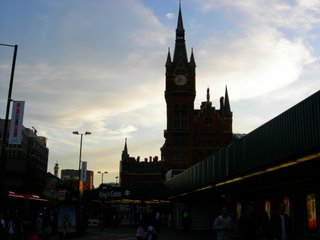 (Wobourne Place, the site of the London bus bomb)
(Wobourne Place, the site of the London bus bomb)A war against a defined enemy can end; a war against an undefined threat can't.
In late November 2002, appearing on the "Washington Journal" program, retired US Army general William Odom told C-SPAN viewers: "Terrorism is not an enemy. It cannot be defeated. It's a tactic. It's about as sensible to say we declare war on night attacks and expect we're going to win that war."
Continuing his heretical comment, Odom said: "We're not going to win the war on terrorism. And it does whip up fear. Acts of terror have never brought down liberal democracies. Acts of parliament have closed a few."
The Mythical End to the Politics of Fear
My opinion exactly when all this talk of 'war' on terror began after 911. I knew, just days after graduating from high school, that the world was going to be very different. The world had just recovered from the silently devastating traumas of the Cold War, just rejoicing in the years of unprecedented prosperity of the 1990s, but terrorism on a scale and exectuted like a horribly exciting and dreadful way that easily rivalled Hollywood special effects changed everything.
Whereas the other -isms of the 20th Century were tangible, visible and credible threats to peace and security (think Nazims, Communism to name but two), terrorism of the 21st Century (though admittedly not a current and modern phenomenon) is the ultimate enemy, the ultimate warfare, where there are no boundaries, where there are no rules of engagement, let alone rules governing war and peace.
A target with no shadow, let alone a body that can be captured, jailed or terminated. And therein lies its strength, for it is a ghost enemy, one that can be seen and can only be conjured by those who want to see it, and those who want to believe it. It is a ghostly presence that haunts and threatens people everywhere and at every moment, and its best tactic is to be unseen and unheard until it strikes again, sending fear and yes, the word itself betrays its objectives all too well, terror, into the lives of innocent people.
 (King's Cross station, site of one of the London tube bombs)
(King's Cross station, site of one of the London tube bombs)But it is also a chameleon at the same time, able to 'move like fish through water', able to blend into any where, and take the body and face of anything and anyone, making everyone and everywhere a potential target, as well as threat all at once. An all-encompassing and all-consuming strategy that instills fear, distrust and dependence on governments who claim they can protect people from such fears.
And it is this dependence in governments that makes this threat even a greater one to democratic values and freedoms. Terrorism can blow up buildings, can crash planes, can blast trains to smitherines, but it cannot undermine the very values and founding principles of a democratic society and polity. But the response to terrorism can. And we have seen how random searches, detentions without cause, spying on citizens, large databases containing the minutest details of each and every one of our habits and lives have encroached our freedoms, in a way that terrorists themselves probably never realised was possible, but are probably rejoicing at.
- Talk about overreaction: Twelve Indians were arrested after a NorthWest Airline plane was escorted back to Schiphol Airport by two F16s, because they were arousing suspicion by fidgeting with their mobiles.
"[the men] western attired, but with beards; clearly Muslims--were irritating during take off. They continued to call with their mobile phones, despite requests to stop."
- On the use of planes as tool of terrorism:
"[...] Exactly on the place where everything should have been well organised, the enemy [must] strikes a sensitive blow . In stead of the actual number of victims, it is maybe more important that the terrorist succeeds to seize control of some ten airplanes and thereby becomes ten times as smart as the authorities.
[...] Flying is in differnt ways special. Flying is a symbol of western arrogance. I see aspiring terrorists in the mountain villages in Afghanistan and Pakistan staring at the sky already, at the silver birds. They swaer revenge on the unbelievers who use technology in order to reach the heavens. This facade triumph of man over God can be nothing else but punished. Just as the sun made an end to the arrogant attempt of Icarus to fly the skies with wax wings, the terrorist similarly makes an end to the arrogance of the flying westerner.
[...] The strategy behind the terrror campanges appears to be aimed at sowing fear by puncturing holes in the protection shield behind which the westerner shelters since he no longer believes in God: the government and the techology which protect his properties and live on a daily basis."
Roland van der Vorst, 'Icarus', pg79, 19 August 2006, Vrij Nederland


























No comments:
Post a Comment